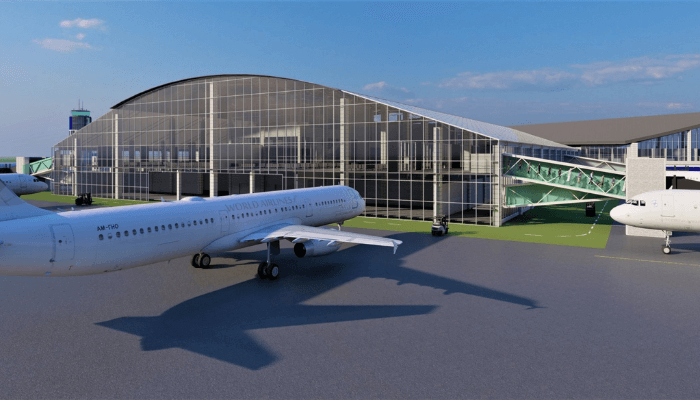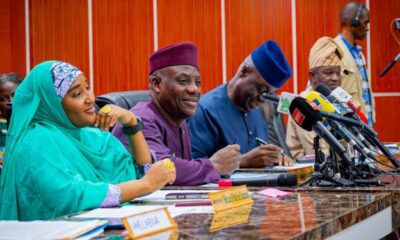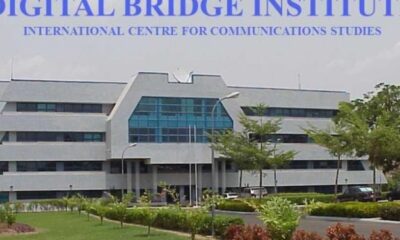NEWS
Ebonyi’s Billion-Naira Airport Still Idle, Plagued by Structural Flaws and Political Shadows

Nearly a year after its high-profile commissioning, the Wilberforce Chuba Okadigbo International Airport in Ebonyi State remains an ambitious structure weighed down by costly repairs, engineering missteps, and bureaucratic inertia.
Touted by the immediate past administration as a revolutionary transport hub that would open up the state to economic development and regional connectivity, the airport today stands largely dormant, with commercial operations still elusive and its facilities under continuous reconstruction.
The airport was conceived and rapidly constructed under former Governor David Umahi, with state officials estimating that over ₦42 billion was spent on the project. But when Governor Francis Nwifuru took office, he inherited what appeared to be a vanity project riddled with flaws—structural, financial, and administrative. It soon became clear that the concrete-paved runway, once presented as an engineering innovation, was not suitable for sustained flight operations. Nwifuru’s government has since spent an additional ₦20 billion reworking it, a figure that triggered public outrage and intensified scrutiny over the project’s initial execution.
The new administration, facing both regulatory and physical challenges, discovered that key components of the airport—including the terminal and control tower—had not been completed to the specifications required by Nigeria’s civil aviation authorities. Governor Nwifuru, in a candid media briefing in Abakaliki, did not conceal his disappointment. He admitted that while his cabinet had approved funds to process vital documents months earlier, the actual work was stalled due to internal miscommunication. His revelation painted a picture of a dysfunctional project plagued by poor oversight and hurried implementation.
The airport’s terminal building, designed with a flat concrete roof, began to leak not long after the first rains of the year. The problem was traced to the design itself rather than construction errors. This defect, the governor noted, would now cost the state ₦2 billion to fix. What made the situation even more disheartening was his disclosure that the roofing contract was awarded directly to a single supplier—Alo Aluminum—on the orders of his predecessor, a move that bypassed competitive bidding and laid the foundation for unaccountability.
Despite assurances from the current Commissioner for Aviation, Ngozi Obichukwu, that the airport is technically sound and capable of handling operations, the reality on ground suggests otherwise. Commercial airlines are yet to establish scheduled flights to and from the airport. The control tower, a fundamental component of flight safety, is still a makeshift structure borrowed from the Nigerian Meteorological Agency, which has since demanded its return. The absence of modern landing instruments further hampers the facility’s ability to handle flights in poor visibility, a minimum requirement for any commercial airport hoping to meet global standards.
Obichukwu maintains that operations are already underway on a charter basis and that regulatory approvals for full-scale commercial activity are being processed. But even her optimism couldn’t mask the disjointed state of affairs surrounding the airport. The Commissioner took aim at media reports alleging the airport had flooded, calling them “mischievous” and “politically motivated,” but she conceded that any misstep in procedure could result in the NCAA withdrawing its interim clearance.
Opposition voices, particularly from the People’s Democratic Party, have described the airport as a monumental fraud. Moses Idika, a vocal critic and party chieftain, accused the Umahi administration of using the project as a conduit for misappropriating public funds. He decried the lack of consultation with aviation authorities before construction and labeled the airport a “substandard facility” that should never have reached commissioning stage in the first place. For him and others, the billions now being poured into fixing the project amount to a second phase of waste and mismanagement.
What compounds the airport saga is the human cost that is rarely spoken of in official briefings. Residents of the host communities in Ezza North and Ezza South, many of whom were forcibly evicted to pave the way for the airport’s construction, continue to nurse their wounds—physical, emotional, and economic. Generations-old farmlands were cleared without fair compensation, and protests against the demolitions were met with the blunt force of state security. While state leaders and traditional authorities praised the airport as a mark of progress, those on the receiving end of the displacement viewed it as a cruel exercise of power.
To many observers, the airport’s location just an hour away from the well-established Akanu Ibiam International Airport in Enugu further undermines its necessity. Critics argue that in a state where over 80 percent of the population lives below the poverty line, and where schools, hospitals, and rural roads remain underfunded, investing in such a grandiose project was both economically unsound and morally questionable. The state’s debt profile, which includes over $92 million in external loans and billions more in domestic liabilities, adds a sobering financial context to what is increasingly viewed as a misguided priority.
Today, the Wilberforce Chuba Okadigbo Airport stands not as a gateway to economic transformation, but as a metaphor for the risks of politicized infrastructure. It is a space where concrete met ambition, but not planning; where funds flowed freely, yet due process stalled; where a runway was laid without a flight plan. Whether Governor Nwifuru’s administration can salvage the project or whether it will remain a cautionary tale of rushed governance and elite excess is a question only time will answer.
Until then, the airport remains curiously quiet—a multimillion-dollar monument to both ambition and dysfunction.
Discover more from Asiwaju Media
Subscribe to get the latest posts sent to your email.
-

 TECH6 days ago
TECH6 days agoFG Launches TVET Initiative To Empower Nigerian Youth With Industry-Relevant Skills
-

 NEWS4 days ago
NEWS4 days ago2025 C-SAGAS Arts and Sciences Competition Officially Flagged Off in Ebonyi State
-

 EDITORIAL3 days ago
EDITORIAL3 days agoHow Chinedu Ogah Perfected the Art of Political Wayo
-

 NEWS6 days ago
NEWS6 days agoTragedy Strikes as 20 Kano Contingent Members Die in Fatal Crash After National Sports Festival
-

 ENTERTAINMENT4 days ago
ENTERTAINMENT4 days agoAngela Okorie Appears To Shade Destiny Etiko After Wedding Drama
-

 CAMPUS REPORTS6 days ago
CAMPUS REPORTS6 days agoCall for Applications: One Young World Leading Scholarship 2025 ( Fully Sponsored Trip to Summit in Munich, Germany)
-

 ENTERTAINMENT6 days ago
ENTERTAINMENT6 days agoCardi B to Offset: “I Want You to Die Slow” Amid Spousal Support Drama
-

 NEWS7 days ago
NEWS7 days agoOver 100 Feared Dead, Dozens Missing As Flood Devastates Mokwa In Niger State
-

 ENTERTAINMENT5 days ago
ENTERTAINMENT5 days agoCarter Efe Slams Portable Over ₦10 Million TikTok Appearance Fee Demand
-

 ECONOMY5 days ago
ECONOMY5 days agoCall for Applications: FG TVET Training Portal Opens for 5 Million Nigerian Youths | (N30,000 Artisan Pay, Free Skills, Starter Kits, and Soft Loans)
-

 CAMPUS REPORTS6 days ago
CAMPUS REPORTS6 days agoNigeria Launches Talent City to Transform Campuses into Tech Hubs and Combat Youth Unemployment
-

 JOBS/SCHOLARSHIPS3 days ago
JOBS/SCHOLARSHIPS3 days agoCall For Applications: Llama Impact Accelerator Program 2025 for African startups (Equity-free funding of $25,000)






















